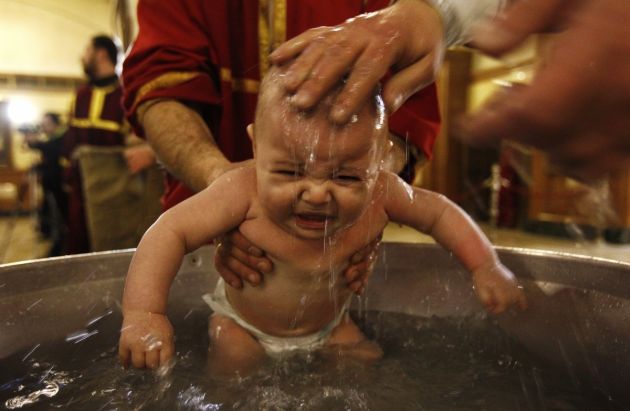Baptism gains in mutual recognition among European and American churches

Swiss Catholic and Protestant churches have signed an agreement to recognize each other's baptisms in part of a growing trend in European and American churches.
The World Council of Churches said on its website some people are a calling the rise of European and North American church body baptismal agreements an "an ecumenical harvest."
Baptism is the Christian rite of admission that invariably involves the use of water.
The day after Easter, a day on which many Christian traditions receive people getting instruction on the rite of baptism, major Swiss churches (Roman Catholic, Reformed, Methodist, Old Catholic, Anglican and Lutheran) signed an agreement on the mutual recognition of baptism.
The April 21 signing ceremony followed an ecumenical interchange sponsored by the Council of Christian Churches in Switzerland.
It took place in Riva San Vitale, Ticino, site of the oldest Christian building in Switzerland.
Among the many divisive historical issues about baptism – initiation into the Christian community – have been the essential elements of the rite and its sacramental character, the baptismal formula, the validity of infant baptisms, and the question of rebaptism.
On January 25, during the annual Week of Prayer for Christian Unity, several Portuguese churches entered a similar pact.
The Anglican Church of Portugal (the Lusitanian Church) hosteds the signing, which also included Portuguese church leaders from the Roman Catholic Church, the Orthodox Church of the Ecumenical Patriarchate of Constantinople, and the Methodist and Presbyterian churches.
U.S. CHURCHES
Last year major U.S. denominations of the Reformed tradition, including the Presbyterian Church (USA), the Reformed Church in America, the Christian Reformed Church in North America and the United Church of Christ, signed an agreement in Austin, Texas, with the National Conference of Catholic Bishops recognizing the validity of each other's practice of baptism.
Many Protestant churches have without success long sought a common table with Catholics at Eucharist, or Lord's Supper, whereby Christians eat bread seen as recognizing the presence of Christ.
Getting united church agreement on baptism has been much easier.
The member churches of the World Council of Churches, which groups more than 500 million Christians, at its 9th assembly at Porto Alegre, Brazil in 2006, affirmed that baptism is the basis of their commitment to one another within the ecumenical movement.
They committed themselves to draw the full consequences from the existing mutual recognition of baptism whilst affirming that "Baptism bestows upon the churches both the freedom and the responsibility to journey toward common proclamation of the Word, confession of the one faith, celebration of one Eucharist, and full sharing in one ministry."
The WCC has Christian unity as one of its key goals and its member churches are follow mainly Anglican, Orthodox and Protestant traditions.
The Roman Catholic Church is not a member of the WCC, but its serves on some of its bodies such as the Faith and Order Commission and it cooperates in many other ways with the Geneva-based church grouping.